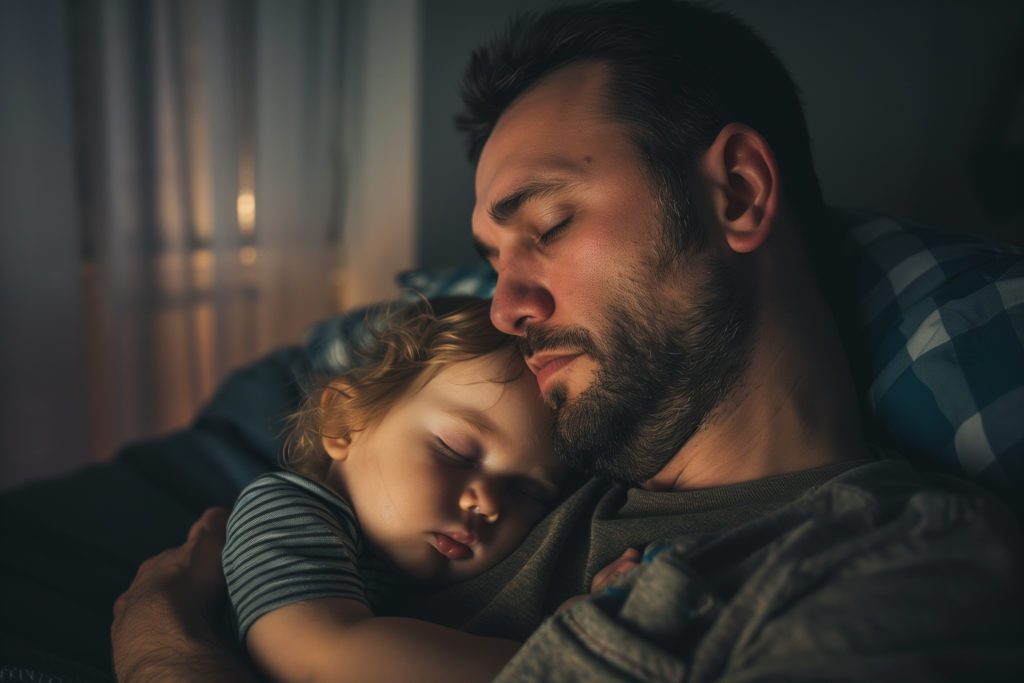
Navigating Sleep Deprivation: Coping Mechanisms for Parents
Getting enough sleep can be a real challenge for new parents. Ways to get better sleep include taking naps, making sleep a priority, and a bedtime ritual.

As a new parent, you are likely very well acquainted with sleep deprivation and utter exhaustion. Until your newborn turns three months or so, they won’t start sleeping through the night and you likely won’t get much uninterrupted sleep. Instead of slumbering away, you’ll be changing diapers and doing multiple feedings every night.
Not getting enough Zzz’s can lead to serious mental and physical health problems. It can make it hard to function and even affect your ability to parent.
We’ve got some good news: there are things you can do to manage during this period and get more sleep. Here’s what you need to know.
Sleep Deprivation in Parents
Sleep deprivation is the worst for the first three months after birth. Women are impacted the most compared to men. It gets better but parents can face sleepless nights for six years after the birth of a child. That’s because children still wake up in the middle of the night more often than adults due to things like nightmares and bedwetting.
How It Affects Your Health
Chronic sleep deprivation can make you feel awful during the day. It can cause you to be forgetful and have trouble concentrating. Here are some of the other impacts on your health:
- Impacts your hormones, including ones that control appetite - Sleep deprivation can interfere with hormone production. Two hormones impacted are ghrelin and leptin, both are associated with hunger. When you don’t get enough sleep, it may cause you to overeat due to imbalances in these hormones.
- Decreased sexual/desire functioning - Sleep loss is associated with sexual problems including erectile dysfunction (ED) in men.
- Increased risk of heart disease and high blood pressure - Long-term sleep deprivation negatively affects heart health.
- Increases the risk of postpartum depression (PPD) - Known as the “baby blues,” PPD is a mood disorder that affects women after giving birth. The chance of developing PPD is higher in sleep-deprived women.
- Impaired immune system functioning - Studies have shown that people who are sleep-deprived are more likely to get sick with viruses and colds.
In addition, sleep deprivation is a major risk factor for motor vehicle accidents. In one study conducted by the AAA, drivers who slept for just 4-5 hours a night had 4 times the crash rate compared to drivers who slept 7 hours or more.
How to Get More Sleep
Sleep is not a luxury, it's a necessity, especially for new parents. Fortunately, there are some things that you can do to get more sleep.
- Take power naps - You need between seven and nine hours of sleep a night. But, these hours don’t have to occur all at once. Power naps can help you get more sleep and boost your alertness during the day. Power naps should be between 20-30 minutes long and should take place mid-day or earlier.
- Establish a calming bedtime ritual - This signals to your brain that it’s time for bed and may help you fall asleep faster. Include stress-relieving activities such as taking a warm bath, reading a few pages of a book, or listening to soothing sleep sounds.
- Don’t over-caffeinate - You might be tempted to cope with sleepless nights by downing lots of caffeine. While caffeine in small amounts is fine, don’t overdo it. Caffeine has a long half-life. And, it’s a stimulant so it will keep you awake at night. So, try to avoid drinking it after midday.
- Make sleep your priority - After putting the little one to bed, it can be tempting to stay up late to finish the dishes or laundry, especially if you can’t get these things done while the baby is awake. However, this isn’t serving you. Getting enough sleep is vital. So, let these things go for the time being. It’s okay if your house is a little messy.
- Talk to your partner - If you are the one primarily waking up with the baby at night, talk to your partner about how it is affecting you. Ask for their support and come up with a plan for you both to have equal responsibility for nighttime awakenings.
- Reach out to your support network - Don’t be afraid to ask friends and family for help. Take them up on their offers to help out with cooking, cleaning, and taking care of the baby. This might give you a chance to get some much-needed rest.
Other Coping Tips
Here are some tips and strategies to help new parents cope with inconsistent sleep.
- Eat well - While you can’t eat your way out of a lack of sleep, the right foods can help you get through the day when you don’t get enough sleep. Opt for fresh whole foods and choose whole grains. Stay away from processed, high-sugar foods that can cause rapid spikes and crashes in blood sugar. This can cause fatigue and irritability. Also, drink plenty of water to stay hydrated. Besides helping you get through a tough day, a healthy, balanced diet can also set you up for higher-quality sleep when you are able to get some shut-eye.
- Take time for physical activity - Exercising during the day can improve your sleep at night. It can also relieve stress, which you might experience from not being well rested.
- Stay off the road - If you haven’t gotten enough sleep, don’t drive. Take an Uber or bus if you really need to go somewhere.
- Talk to a professional - Getting professional help is important if you are experiencing signs of postpartum depression such as depressed mood, irritability, and worthlessness. PDD can interfere with your sleep, as well. So, it’s important to get treatment for it.
Final Thoughts on Navigating Sleep Deprivation
Even if you do all of the above things, you will likely still suffer from some level of sleep deprivation while your baby is still an infant.
Relax as much as possible and don’t stress over things like house cleaning and cooking. Order takeout and consider hiring a housekeeper or babysitter to help out. Finally, if you are suffering serious effects of prolonged or severe sleep deprivation, talk to your doctor.
FAQ
How does sleep deprivation affect my cognitive functions and daily decision-making?
Lack of sleep can impair memory, slow reaction times, and decrease concentration, making it harder to manage daily tasks effectively. It can also lower problem-solving skills and emotional regulation, leading to increased stress and frustration in parenting and decision-making.
Can exercise help mitigate the effects of sleep deprivation?
Moderate exercise, such as walking or yoga, can boost energy, improve mood, and enhance sleep quality. However, exercising too close to bedtime can overstimulate the body and make it harder to fall asleep. Short bursts of movement during the day can also help combat fatigue.
What role does stress play in exacerbating sleep deprivation for new parents?
High stress levels can trigger the release of cortisol, making it harder to fall asleep and stay asleep. Practicing relaxation techniques like meditation, deep breathing, and setting realistic expectations can help manage stress and promote better sleep quality.
Is it normal to experience changes in mood or increased irritability due to sleep deprivation?
Yes, sleep deprivation can cause mood swings, irritability, and heightened emotional responses. Prioritizing rest, seeking support, and practicing self-care can help parents better manage their emotions and prevent burnout caused by lack of sleep.
What are some effective nap strategies for parents dealing with sleep deprivation?
Short power naps of 20-30 minutes can provide a quick energy boost without leaving you groggy. Aligning naps with your baby's sleep schedule and creating a relaxing environment can help maximize the benefits of daytime rest without affecting nighttime sleep.
How can I involve my partner in managing nighttime wake-ups to reduce sleep deprivation?
Sharing responsibilities by alternating night shifts or taking turns for feedings and diaper changes can help distribute the burden. Discussing schedules in advance and ensuring both partners get a chance to rest can create a fair and sustainable system.
What professional support options are available for parents struggling with sleep deprivation?
Parents can seek support from sleep consultants, lactation consultants, or pediatricians to address sleep challenges. Joining parenting support groups or seeking therapy can also provide emotional support and practical strategies for coping with exhaustion.

Written by
Emily Mendez
Emily Mendez is a former therapist and mental health author. She is one of the leading voices in mental health. Emily's writing has appeared in eCounseling, SonderMind, and more. Emily is frequently interviewed by Healthline, Fatherly, INSIDER, Family Circle, and other national media for her advice and expert opinion on the latest mental health topics.
Download Pillow
Get help
Press & News
Legal
Connect
X (Twitter)
Company
Copyright © Neybox Digital Ltd.



